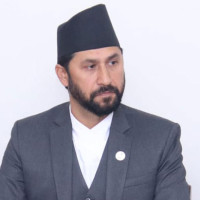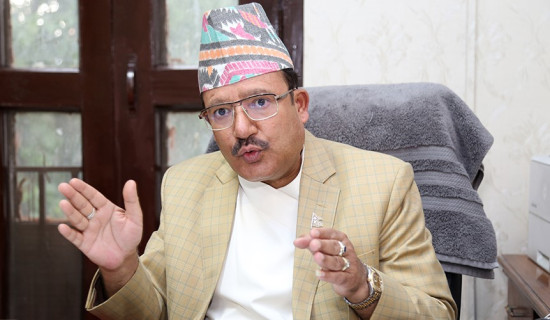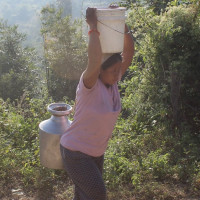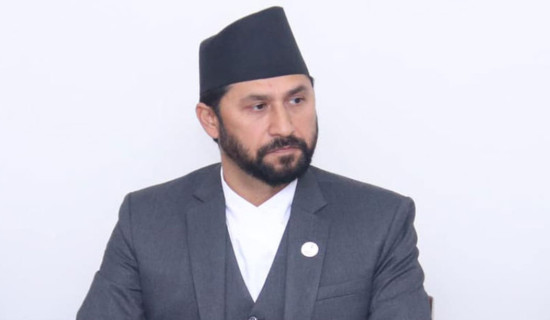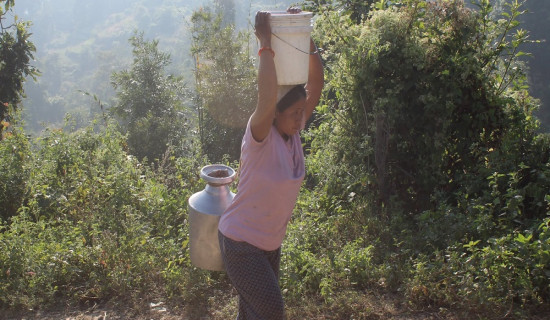- Thursday, 26 February 2026
Dengue continues to spread
By A Staff Reporter, Kathmandu, Sept. 6: Dengue cases have been increasing rapidly across the country with detection of more cases in the Kathmandu Valley and the western Terai in the recent days.
Besides three districts of the Valley – Kathmandu, Lalitpur and Bhaktapur – the cases have increased significantly in Banke, Dang, Bardiya of Lumbini Province and Saptari of Madhes Province.
As of Sunday, the Ministry of Health and Population reported 2816 dengue cases in the Kathmandu Valley, with the highest cases in Lalitpur (1832) followed by Kathmandu (888). The nationwide tally was 5029 as of Sunday.
With the multiplying cases in the valley, Kathmandu Metropolitan City (KMC) has continued its house-to-house campaign to control the spread of the mosquito-borne disease.
On Monday, KMC started rapid diagnostic test of the disease at ward level with labs in wards 19, 26 and 30.
Dengue is transmitted to humans by infected mosquitoes of the Aedes species. Balaram Tripathi, head of the Public Health Department of KMC, said, “We have conducted a door-to-door programme for dengue control, diagnostic, therapeutic methods and awareness.” Prevention is the most reliable way to control the spread of the disease, he added.
The drive against the dengue outbreak started in all 32 wards of KMC on August 29, following the training to the in-charges of all ward clinics on dengue prevention and control.
Meanwhile, according to our Dang correspondent Liladhar Oli, 148 dengue fever cases have been reported in the hospitals of Ghorahi Sub-Metropolitan City, informed Narayan Gharti, head of health department of the metropolis.
Stating that the sharp rise of dengue cases in Tulasipur and Lamahi area of Ghorahi has been quite worrisome, Gharti informed that awareness programme has been conducted urging the citizens not to take medicine without prescriptions.
Accoridng to our Banke Correspondent Siraj Khan, eleven persons in Banke, five of them in Nepalgunj Sub-Metropolitan City–4, two in Kohalpur and one in Baijanath tested positive for dengue fever on Monday. Three of the dengue patients detected in Banke were from Bardiya and Kailali districts.
They were tested positive for dengue in health labs, said the Health Office Banke.
Nepalgunj has reported other dengue cases but the man who first tested positive in Ganeshpur had not left the city. “This means that the disease is prevalent in the community and can spread to other people too,” worried Ram Bahadur Chand, chief of the Health Division of Nepalgunj sub-metro. “We have now started destroying mosquito eggs and larvae and are conducting awareness programmes,” he informed.
Chand added that they had found a large number of mosquito larvae in water collected in tyres and bottles. Health workers, elected representatives, female community health volunteers and local residents have also started a campaign to inform people about the disease and the necessary precautions to be taken from Monday.
Dengue is spread through the bite of the female Aedes aegypti mosquito. “Therefore, the best precaution to take is not get bitten,” said Durga Gautam, contact person for vector-borne diseases at Banke’s District Public Health Office.
Eliminating stagnant water collected in pots, ditches, fountains, vases, bottles, tyres, tanks etc., using mosquito nets and mosquito repellent and wearing full-sleeved, light-coloured clothing could be a few ways to keep mosquitoes at bay.
Gopal Pun, chairman of Nepalgunj Ward No. 4, said that they were on high alert following the confirmation of a dengue case in the ward.
Meanwhile, the man who tested positive in Khadak in Saptari is in a serious condition and is being treated in the Intensive Care Unit (ICU) of the B.P. Koirala Institute of Health Sciences. According to our Saptari correspondent Mala Karn, the patient is 60 years old.
Jay Prakash Chaudhary, mayor of Khadak Municipality, told The Rising Nepal that the local government had taken the disease very seriously and had begun conducting health checks and fumigation in Ward No. 8.




